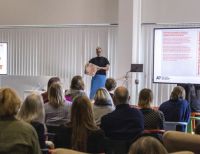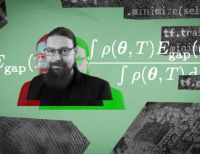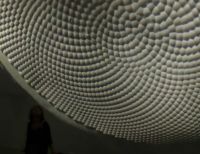In a very cold vacuum chamber, single atoms of silver form a star-like lattice. The precise formation is not accidental, and it wasn’t constructed directly by human hands either. Researchers used a kind of artificial intelligence called deep reinforcement learning to steer the atoms, each a fraction of a nanometer in size, into the lattice shape. The process is similar to moving marbles around a Chinese checkers board, but with very tiny tweezers grabbing and dragging each atom into place.
The main application for deep reinforcement learning is in robotics, says postdoctoral researcher I-Ju Chen. “We’re also building robotic arms with deep learning, but for moving atoms,” she explains. “Reinforcement learning is successful in things like playing chess or video games, but we’ve applied it to solve technical problems at the nanoscale.”
So why are scientists interested in precisely moving atoms? Making very small devices based on single atoms is important for nanodevices like transistors or memory. Testing how and whether these devices work at their absolute limits is one application for this kind of atomic manipulation, says Chen. Building new materials atom-by-atom, rather than through traditional chemical techniques, may also reveal interesting properties related to superconductivity or quantum states.
The silver star lattice made by Chen and colleagues at the Finnish Center for Artificial Intelligence FCAI and Aalto University is a demonstration of what deep reinforcement learning can achieve. “The precise movement of atoms is hard even for human experts,” says Chen. “We adapted existing deep reinforcement learning for this purpose. It took the algorithm on the order of one day to learn and then about one hour to build the lattice.” The reinforcement part of this type of deep learning refers to how the AI is guided—through rewards for correct actions or outputs. “Give it a goal and it will do it. It can solve problems that humans don’t know how to solve.”
Applying this approach to the world of nanoscience materials is new. Nanotechniques can become more powerful with the injection of machine learning, says Chen, because it can accelerate the parameter selection and trial-and-error usually done by a person. “We showed that this task can be completed perfectly through reinforcement learning,” concludes Chen. The group’s research, led by professors Adam Foster and Peter Liljeroth, was recently published in Nature Communications.
Reference
Chen IJ, Aapro M, Kipnis A, Ilin A, Liljeroth P, Foster AS (2022). Precise atom manipulation through deep reinforcement learning. Nat Comms. doi: 10.1038/s41467-022-35149-w







